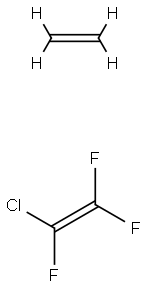ECTFE has thermal and oxidative stability up to 150–175 ° C.
It is chemically inert to a number of chemicals and solvents
and has good permeability resistance. The copolymer is
50–55% crystalline, depending on the method of preparation.
Chlorotrifluoroethylene-ethylene copolymers (ECTFE) contain about 50
mole % chlorotrifluoroethylene. These copolymers are generally similar to
the tetrafluoroethylene-ethylene copolymers in that they are
melt-processable and have high impact strength and good chemical resistance. The
temperature range of useful performance is from about - 80°C to 170°C.
Chlorotrifluoroethylene-ethylene copolymers find use in injection mouldings
for chemical process equipment and cable insulation.
Wire and cable insulation is the primary application
of ECTFE.
PCTFE is a polymer of chlorotrifluoroethylene. Copolymerization
of ethylene and chlorotrifluoroethylene is carried out
by aqueous suspension techniques, by low-temperature polymerization
initiated by oxygen-activated triethylboron in
dichlorotetrafluoroethane, and by radiation-induced polymerization.
